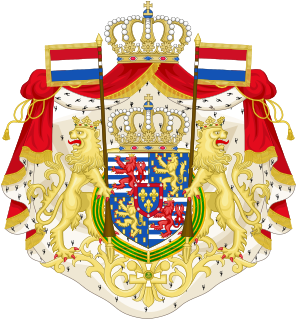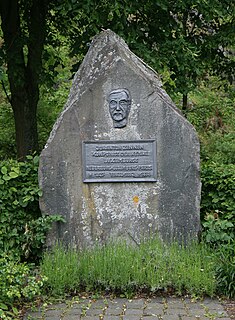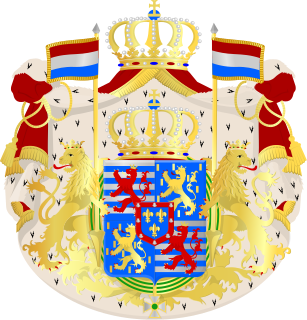Related Research Articles
The Grand Ducal Family of Luxembourg constitutes the House of Luxembourg-Nassau, headed by the sovereign Grand Duke, and in which the throne of the grand duchy is hereditary. It consists of heirs and descendants of the House of Nassau-Weilburg, whose sovereign territories passed cognatically from the House of Nassau to a cadet branch of the House of Bourbon-Parma, itself a branch of the Spanish Royal House which is agnatically a cadet branch of the House of Capet that originated in France. This is descended from the Capetian dynasty – itself a derivative dynasty from the Robertians.

The Grand Duke of Luxembourg is the monarchical head of state of Luxembourg. Luxembourg has been a grand duchy since 15 March 1815, when it was created from territory of the former Duchy of Luxembourg. It was in personal union with the United Kingdom of the Netherlands until 1890 under the House of Orange-Nassau. Luxembourg is the world's only sovereign grand duchy and since 1815, there have been nine monarchs, including the incumbent, Henri.

Jean Antoine Zinnen was a Luxembourgian composer, best known for the Luxembourgish national anthem, Ons Hémécht.

Jean was the Grand Duke of Luxembourg from 1964 until his abdication in 2000. He was the first Grand Duke of Luxembourg of French agnatic descent.

Prince Guillaume, Hereditary Grand Duke of Luxembourg, is the heir apparent to the crown of Luxembourg since his father's accession in 2000.
The Music of Luxembourg is an important component of the country's cultural life. The prestigious new Philharmonie concert hall provides an excellent venue for orchestral concerts while opera is frequently presented in the theatres. Rock, pop and jazz are also popular with a number of successful performers. The wide general interest in music and musical activities in Luxembourg can be seen from the membership of the Union Grand-Duc Adolphe, the national music federation for choral societies, brass bands, music schools, theatrical societies, folklore associations and instrumental groups. Some 340 music groups and associations with over 17,000 individual members are currently represented by the organization.

Prince Félix of Luxembourg is the second son of Henri, Grand Duke of Luxembourg, and Maria Teresa, Grand Duchess of Luxembourg. He is currently third in the line of succession.
Alm and ALM most commonly refer to:

Princess Alexandra of Luxembourg, Princess of Nassau and Princess of Bourbon-Parma is the fourth child and only daughter of Henri, Grand Duke of Luxembourg, and Maria Teresa, Grand Duchess of Luxembourg.

The culture of Luxembourg refers to the cultural life and traditions of Luxembourg. Most citizens are trilingual, speaking French and German in addition to the Germanic national language of Luxembourgish. Although its contributions to the arts are not largely known outside its borders, Luxembourg has a rich cultural history, especially in music, painting and photography. Its evolving museums, concert halls, theatres and galleries testify to its citizens' growing appreciation of culture.

The Philharmonie Luxembourg, also known officially as the Grande-Duchesse Joséphine-Charlotte Concert Hall, is a concert hall located in the European district in the Luxembourg City quarter of Kirchberg. Opened in 2005, it now plays host to 400 performances each year.

Luxemburger Wort is a German-language Luxembourgish daily newspaper. There is an English edition named the Luxembourg Times.

The Order of the Gold Lion of the House of Nassau is a chivalric order shared by the two branches of the House of Nassau.
Pol Albrecht (1874–1975) was a Luxembourg composer, conductor and bandmaster.
Julien Hoffmann was a Luxembourgian composer and Professor of Music. Notable arrangements by Hoffman include "Arrangement fir 3 gleich Stömmen" "Arrangement fir Gemöschte Cho'er" and "La Provence", the last composed with Ralph Siegel. Other compositions include "Léif Consolatrix", arranged by Patrick Colombo and published by the Musica International Musica Sacra Luxembourg and " Halleluja " with Kobi Oshrat, which like "La Provence" was published by Bosworth Musikverlag.
Michel Stoffel (1903–1963) was a Luxembourg artist and author. He also worked for a time in the insurance sector. Together with Joseph Kutter, he is considered to be one of Luxembourg's most prominent painters.
Alexander Mullenbach is a Luxembourg pianist, composer and conductor. Since 2002, he has been director of the International Summer Academy at the Mozarteum in Salzburg.

The Luxembourg Military Band, known locally as the Musique militaire grand-ducale, was founded in 1842 and has been a major contributor to Luxembourg's musical heritage. In addition to official performances for the Grand-Duke, the national government and the Luxembourg Army, the band frequently gives concerts in and around Luxembourg City.

Luxembourg art can be traced back to Roman times, especially as depicted in statues found across the country and in the huge mosaic from Vichten. Over the centuries, Luxembourg's churches and castles have housed a number of cultural artefacts but these are nearly all ascribed to foreign artists. The first examples of art with a national flavour are paintings and maps of the City of Luxembourg and its fortifications from the end of the 16th until the beginning of the 19th century, although these too were mostly created by foreign artists. Real interest in art among the country's own citizens began in the 19th century with paintings of Luxembourg and the surroundings after the country became a grand duchy in 1815. This was followed by interest in Impressionism and Expressionism in the early 20th century, the richest period in Luxembourg painting, while Abstraction became the focus of art after the Second World War. Today there are a number of successful contemporary artists, some of whom have gained wide international recognition.

The Eyschen Ministry was in office in Luxembourg for 27 years, from 22 September 1888 to 12 October 1915, when Paul Eyschen died.
References
- 1 2 "Union Grand-Duc Adolphe", Luxemburger Lexikon, Editions Guy Binsfeld, Luxembourg, 2006. (in German)
- 1 2 3 "Union Grand-Duc Adolphe: Verbandsgeschichte" Archived 2011-07-22 at the Wayback Machine , UGDA. (in German) Retrieved 9 January 2011.
- ↑ "Ecole de Musique de l'UGDA", UGDA. (in French) Retrieved 9 January 2011.